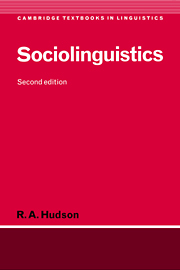Preface to the second edition
Published online by Cambridge University Press: 05 June 2012
Summary
This edition is very different from the first – as it ought to be, after sixteen years! Over a third of the text is completely new; I have added a whole new chapter (7: Theoretical summary) to replace the very short ‘Conclusions’ in the first edition, and nine new sections to compensate for fourteen which I have removed.
Some of the changes were needed because of changes in my own ideas; the new theoretical summary is an attempt to explain these ideas. But most of them reflect developments in the field since 1979. Some ideas appear to have died: variable rules, panlectal grammars and restricted codes. Some new ideas have been born (or at least grown very fast): face, politeness, accommodation and prototypes. Some research areas have expanded enormously: sex differences of all kinds, and the relationship between language and thought; and some have turned into well-established separate disciplines which no longer need a place in this book: discourse analysis and pidgin and Creole studies. The parts of sociolinguistics that were already bearing fruit in 1979 are still producing interesting and important findings.
Sociolinguistics is much more accessible now, thanks in part to a monumental research aid, the Encyclopedia of Language and Linguistics, which is very strong on sociolinguistics, plus other important sources such as the smaller International Encyclopedia of Linguistics and Labov's Principles of Linguistic Change: Internal Factors – not to mention a host of excellent textbooks which have appeared since my own (especially Fasold 1984, 1990, Holmes 1992, Wardhaugh 1986).
- Type
- Chapter
- Information
- Sociolinguistics , pp. xiii - xivPublisher: Cambridge University PressPrint publication year: 1996



